Manuel Castells: The Power of Identity: The Information Age: Economy, Society, and Culture, 2nd ed. (2009)
Filed under book | Tags: · economy, globalisation, identity, information society, network culture, networks, politics, social movements, technology, terrorism, women
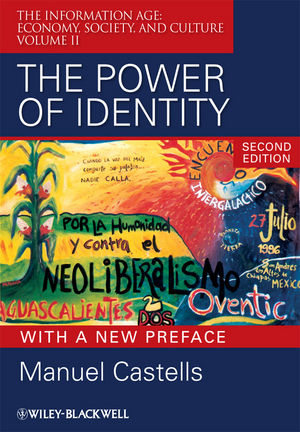
In this second volume of The Information Age trilogy, with an extensive new preface following the recent global economic crisis, Manuel Castells deals with the social, political, and cultural dynamics associated with the technological transformation of our societies and with the globalization of the economy.
* Extensive new preface examines how dramatic recent events have transformed the socio-political landscape of our world
* Applies Castells’ hypotheses to contemporary issues such as Al Qaeda and global terrorist networks, American unilateralism and the crisis of political legitimacy throughout the world
* A brilliant account of social, cultural, and political conflict and struggle all over the world
* Analyzes the importance of cultural, religious, and national identity as sources of meaning for people, and its implications for social movement
* Throws new light on the dynamics of global and local change
Publisher John Wiley and Sons, 2009
Information Age Series, Manuel Castells
ISBN 1405196874, 9781405196871
Length 584 pages
Sarai Media Lab (eds.): Sensor-Census-Sensor: An International Colloquium on Information, Society, History and Politics. A Report (2007)
Filed under report | Tags: · censorship, india, information society, neoliberalism, networks, politics, surveillance, technology
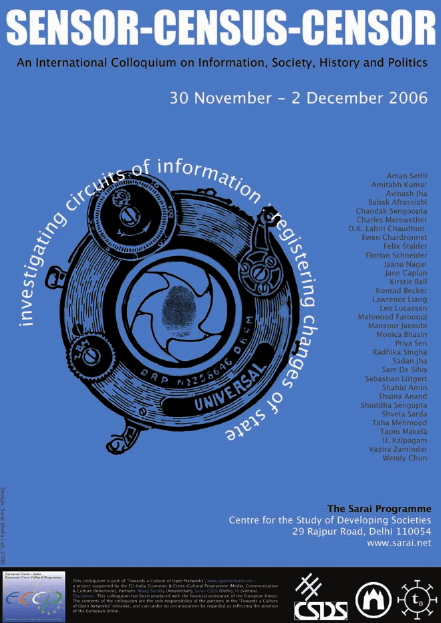
This book is a report on the International Colloquium that took place from November 30th, 2006 to December 2nd, 2006
Critical examination and investigation of the regimes and technologies of information harvesting, management, circulation and deployment as they have developed in India and Europe from early modernity till today.
The colloquium was organized by the Sarai Programme at CSDS, Delhi, in collaboration with the Waag Society, Amsterdam, and t0, Vienna, under the rubric of the network titled ‘Towards a Culture of Open Networks’
Sensor-Census-Sensor: Investigating Circuits of Information, Registering Changes of State
Produced and designed at the Sarai Media Lab, Delhi
Published by: The Sarai Programme, Delhi, India, November 2007
ISBN 9788190585378
PDF (PDF chapters, updated on 2014-8-29)
Comment (0)Turbulence journal 1-5 (2007-2009)
Filed under journal | Tags: · activism, capitalism, climate crisis, neoliberalism, networks, politics
Turbulence is a journal/newspaper that we hope will become an ongoing space in which to think through, debate and articulate the political, social, economic and cultural theories of our movements, as well as the networks of diverse practices and alternatives that surround them.

What would it mean to win?
Turbulence 1, 2007
The Turbulence collective produced 7,000 copies of a free 32-page newspaper distributed at the camps, blockades and alternative summits that made up the mobilisation against the G8 summit in Heiligendamm in June 2007. The theme of the 14 articles from individuals and groups from across the world tackled the difficult question of ‘What would it mean to win?’.
PDF (original tabloid format, 289 x 380mm)
PDF (journal format, 152 x 229mm)
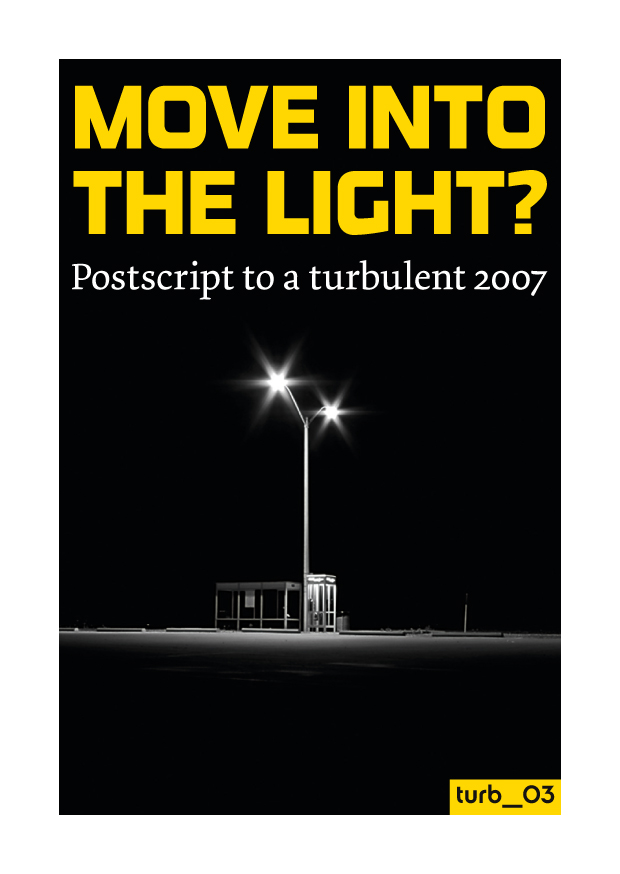
Move into the light?
Turbulence 3, December 2007
6,000 copies were printed in English, with a further 4,000 in German.
PDF (A6 booklet)
PDF (German version)
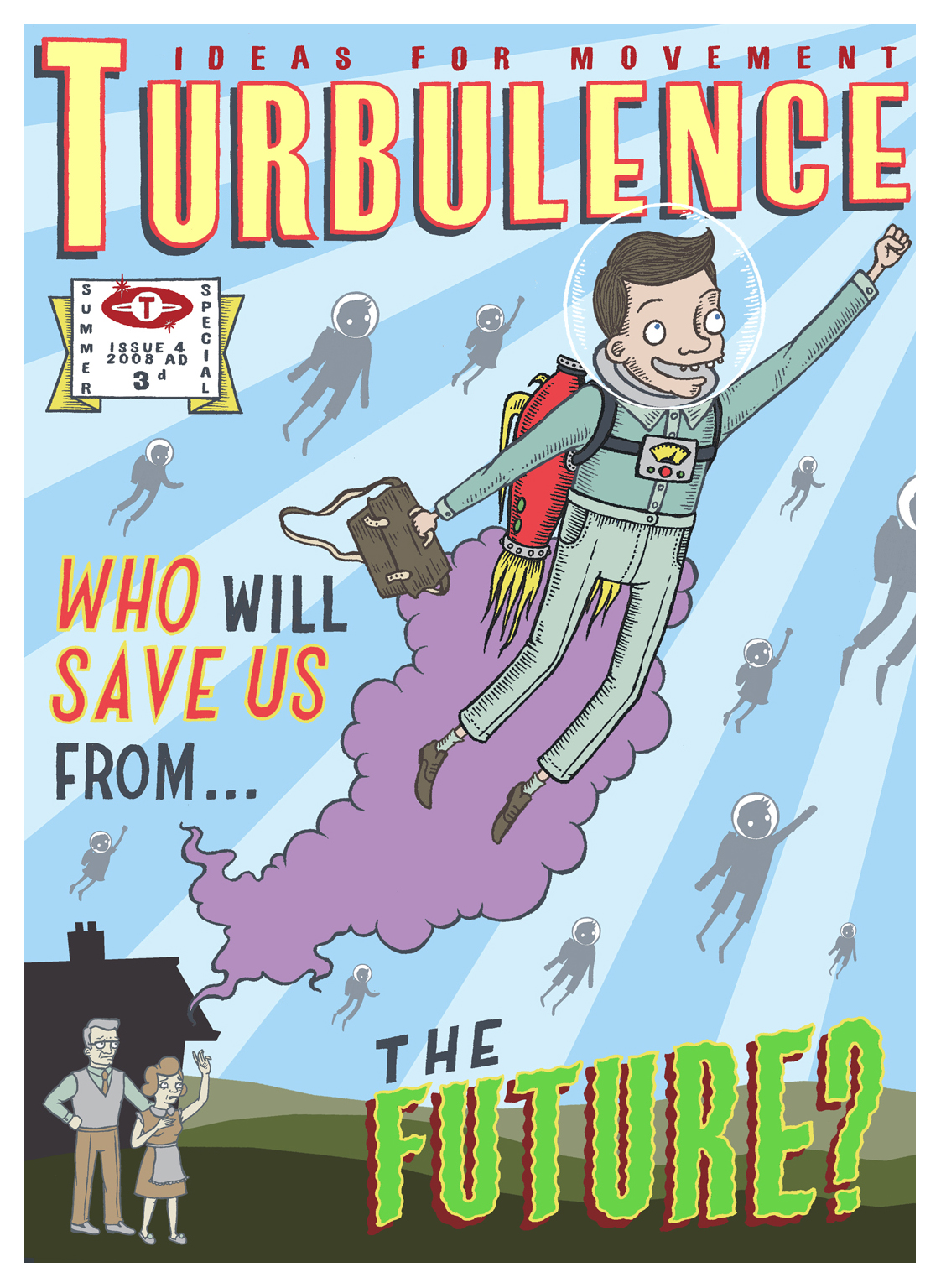
Who can save us from the future?
Turbulence 4, Summer 2008
Today, the very act of thinking about the future has become a problem. What both capitalism and ‘really existing socialism’ had in common was the belief in a future where infinite happiness would spring from the infinite expansion of production: sacrifices made in the present could always be justified in terms of a brighter future. And now? The socialist future has been dead since the fall of the Berlin wall. After that we seemed to live in a world where only the capitalist future existed (even when it was under attack). But now this future, too, is having its obituaries composed, and impending doom is the talk of the town. The ‘crisis of the future’ – that is, of our capacity to think about the future – is born out of these twin deaths: today it is easier to imagine the end of the world than the end of capitalism.
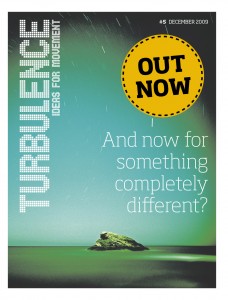
And Now for Something Completely Different?
Turbulence 5, December 2009
Until recently, anyone who suggested nationalising the banks would have been derided as a ‘quack’ and a ‘crank’, as lacking the most basic understanding of the functioning of a ‘complex, globalised world’. The grip of ‘orthodoxy’ disqualified the idea, and many more, without the need even to offer a counter-argument.
And yet, in this time of intersecting crises, when it seems like everything could, and should, have changed, it paradoxically feels as though very little has. Individuals and companies have hunkered down to try and ride out the crisis. Nationalisations and government spending have been used to prevent change, not initiate it. Anger and protest have erupted around different aspects of the crises, but no common or consistent reaction has seemed able to cohere. We appear unable to move on.
For many years, social movements could meet and recognise one another on the common ground of rejecting neoliberalism, society’s old middle ground – those discources and practices that defined the centre of the political field. The crisis of the middle has meant a crumbling of the common.
And what now? Will neoliberalism continue to stumble on without direction, zombie-like? Or, is it time for something completely different?
Comment (0)
